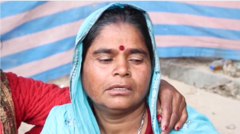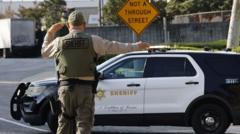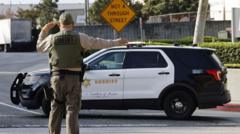As families mourn the loss of loved ones in the recent Kumbh Mela disaster, questions arise about crowd control and emergency responses, with authorities facing scrutiny for their handling of the situation.
Tragedy Strikes Kumbh Mela as Families Grieve Victims of Deadly Crush

Tragedy Strikes Kumbh Mela as Families Grieve Victims of Deadly Crush
A devastating crush during the Kumbh Mela in Prayagraj has left at least 30 dead, prompting nationwide mourning and investigations into safety measures.
Families are reeling from the tragic loss of their loved ones following a deadly crush at the Kumbh Mela, the world's largest religious gathering held in northern India. The incident occurred on one of the holiest days of the six-week event, claiming the lives of at least 30 individuals and leaving families devastated as they await the return of their deceased relatives’ bodies.
The chaos unfolded in Prayagraj city, at the Sangam—a revered site where the Ganges, Yamuna, and mythical Saraswati rivers converge, drawing millions of pilgrims from around the globe. Eyewitness accounts suggest that the deadly crush resulted when a surge of devotees trampled over others who were resting near the riverbank. Many attendees have voiced concerns regarding inadequate crowd control measures and insufficient space for pilgrim movement, squarely blaming the police and festival authorities for the tragedy.
In light of the incident, the Uttar Pradesh government has initiated a judicial investigation to determine accountability. Meanwhile, mourning families are grappling with the immediate aftermath, longing for answers and, in some cases, still searching for missing relatives.
Kaikeyi Devi, who traveled from Bihar with her husband, recounted the harrowing moment she witnessed him being trampled. "He was dragged in the chaos, and we started crying… 'Let him be!' but he never came back," she recounted outside a mortuary in Prayagraj.
Taposh Roy from Assam experienced a tragic scenario where his brother lay unattended for an agonizingly long time due to a lack of ambulances. "We pleaded with the police, but they told us to wait," he shared, highlighting the slow response to emergencies. Similar feelings of distress were echoed by Tarun Bose of West Bengal, who lamented the delay in retrieving his relative’s body.
Others, like Deepak Hattarwat from Karnataka, are coping with devastating news of losing his wife and daughter as he learned of their deaths a day late from another traveler in their group. “What should I do and for whom should I live now?” he expressed, reflecting the deep anger and grief resonating with those affected.
As the days pass since the tragedy, some families continue their desperate searches for missing loved ones. Manoj Kumar Sahni from Bihar shared, "I have been searching for my father for three days. I went to hospitals and station but couldn't find him."
In response to the crush, festival authorities have increased security and confined vehicle access to the grounds until February 4, anticipating massive crowds for the next auspicious bathing day on Monday. As the Kumbh Mela continues, the weight of this tragedy looms large over all in attendance, serving as a stark reminder of the importance of safety and preparedness in large gatherings.





















